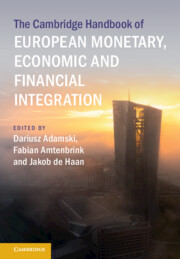50 results
Contents
-
- Book:
- The Cambridge Handbook of European Monetary, Economic and Financial Integration
- Published online:
- 28 September 2023
- Print publication:
- 12 October 2023, pp v-viii
-
- Chapter
- Export citation
Introduction
-
-
- Book:
- The Cambridge Handbook of European Monetary, Economic and Financial Integration
- Published online:
- 28 September 2023
- Print publication:
- 12 October 2023, pp 1-16
-
- Chapter
- Export citation
Part I - The Economic and Monetary Union
-
- Book:
- The Cambridge Handbook of European Monetary, Economic and Financial Integration
- Published online:
- 28 September 2023
- Print publication:
- 12 October 2023, pp 17-152
-
- Chapter
- Export citation
Contributors
-
- Book:
- The Cambridge Handbook of European Monetary, Economic and Financial Integration
- Published online:
- 28 September 2023
- Print publication:
- 12 October 2023, pp ix-xvi
-
- Chapter
- Export citation
Part III - The Economic and Fiscal Dimensions
-
- Book:
- The Cambridge Handbook of European Monetary, Economic and Financial Integration
- Published online:
- 28 September 2023
- Print publication:
- 12 October 2023, pp 267-418
-
- Chapter
- Export citation
Part II - The Monetary Dimension
-
- Book:
- The Cambridge Handbook of European Monetary, Economic and Financial Integration
- Published online:
- 28 September 2023
- Print publication:
- 12 October 2023, pp 153-266
-
- Chapter
- Export citation
Copyright page
-
- Book:
- The Cambridge Handbook of European Monetary, Economic and Financial Integration
- Published online:
- 28 September 2023
- Print publication:
- 12 October 2023, pp iv-iv
-
- Chapter
- Export citation
4 - On the Misalignment of Monetary, Economic, and Political Integration in European Economic and Monetary Union
- from Part I - The Economic and Monetary Union
-
-
- Book:
- The Cambridge Handbook of European Monetary, Economic and Financial Integration
- Published online:
- 28 September 2023
- Print publication:
- 12 October 2023, pp 69-86
-
- Chapter
- Export citation
Part IV - Financial Integration
-
- Book:
- The Cambridge Handbook of European Monetary, Economic and Financial Integration
- Published online:
- 28 September 2023
- Print publication:
- 12 October 2023, pp 419-552
-
- Chapter
- Export citation
Index
-
- Book:
- The Cambridge Handbook of European Monetary, Economic and Financial Integration
- Published online:
- 28 September 2023
- Print publication:
- 12 October 2023, pp 553-582
-
- Chapter
- Export citation

The Cambridge Handbook of European Monetary, Economic and Financial Integration
-
- Published online:
- 28 September 2023
- Print publication:
- 12 October 2023
List of Publications of Professor Laurence W. Gormley
-
- Book:
- The Internal Market and the Future of European Integration
- Published online:
- 04 May 2019
- Print publication:
- 18 April 2019, pp 716-728
-
- Chapter
- Export citation
Foreword
-
- Book:
- The Internal Market and the Future of European Integration
- Published online:
- 04 May 2019
- Print publication:
- 18 April 2019, pp xix-xxii
-
- Chapter
- Export citation
Part VI - The Future of the Internal Market
-
- Book:
- The Internal Market and the Future of European Integration
- Published online:
- 04 May 2019
- Print publication:
- 18 April 2019, pp 493-602
-
- Chapter
- Export citation
Contents
-
- Book:
- The Internal Market and the Future of European Integration
- Published online:
- 04 May 2019
- Print publication:
- 18 April 2019, pp ix-xiii
-
- Chapter
- Export citation
Contributors
-
- Book:
- The Internal Market and the Future of European Integration
- Published online:
- 04 May 2019
- Print publication:
- 18 April 2019, pp xiv-xviii
-
- Chapter
- Export citation
Table of Cases
-
- Book:
- The Internal Market and the Future of European Integration
- Published online:
- 04 May 2019
- Print publication:
- 18 April 2019, pp xxvii-lxix
-
- Chapter
- Export citation
Part III - Persons
-
- Book:
- The Internal Market and the Future of European Integration
- Published online:
- 04 May 2019
- Print publication:
- 18 April 2019, pp 215-302
-
- Chapter
- Export citation
Part I - Constitutional
-
- Book:
- The Internal Market and the Future of European Integration
- Published online:
- 04 May 2019
- Print publication:
- 18 April 2019, pp 13-112
-
- Chapter
- Export citation
Part IV - Economic and Monetary Governance
-
- Book:
- The Internal Market and the Future of European Integration
- Published online:
- 04 May 2019
- Print publication:
- 18 April 2019, pp 303-396
-
- Chapter
- Export citation



